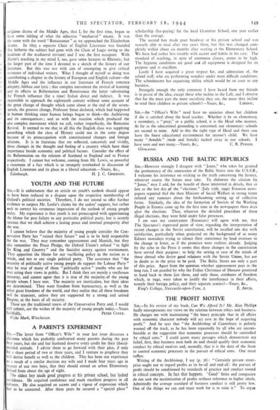RUSSIA AND THE BALTIC REPUBLICS
SIR,—However strongly I disagree with "Janus," who takes for granted the permanency of the annexation of the Baltic States into the U.S.S.R., I welcome his insistence on sticking to the truth concerning the history, whatever course the future may take. To elaborate the citation by "Janus," may I add, for the benefit of those interested in details, that as late as the last day,taf the " elections " (July 15th, 1940) Estonian news- papers reported that the then Minister of Social Welfare in strong terms refuted any rumours about the forthcoming setting up of collective farms. Similarly, the idea of the formation of Soviets of the Working• People in Estonia came up for the first time in the newspapers three days after the elections. Thus, whatever the detailed procedure of those illegal elections, they were held under false pretences.
I am sure my countrymen (Estonians) will agree with me, that The Spectator's expressed point of view, regarding the interpretation of recent changes in the Soviet constitution, will be recalled one day with satisfaction, particularly when projected on the background of so many Editors nowadays trying to silence their conscience by loud ovations to the change in letter, as if the promises were realities already. Judging by the echo in the Press it seems that those changes in the constitution have served their purpose: to help the setting at ease of the minds of those abroad who desire good relations with the Soviet Union, but are in doubt as to the price to be paid. The Baltic States are only a part of this price. Apart from the question whether appeasement pays in the long run, I am puzzled by why the Father Christmas of Moscow promised to hand back to them just those, and only those, attributes of freedom Which, in 1940, were taken to justify the interference in their affairs, namely their foreign policy, and their separate armies?—Yours, &c., King's College, Newcastle-upon-Tyne, 2. E. ARUJA.


























 Previous page
Previous page